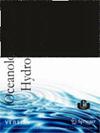直针翼足类Creseis acicula Rang的首次记录,1828年在Çanakkale海峡(土耳其爱琴海东北部)开花
IF 1
4区 环境科学与生态学
Q4 OCEANOGRAPHY
引用次数: 2
摘要
摘要翼龙目是一种海洋上层钙化软体动物,由于其高度可溶的文石外壳,对海水中的化学变化很敏感。海水酸度增加(pH值降低)会导致贝壳难以沉淀和/或溶解,这与大气中二氧化碳浓度增加和海水变暖有关。因此,它们是环境变化的指标。在这篇论文中,我们首次记录了1828年在土耳其阿纳卡莱海峡(爱琴海东北部)表层水域开花的直针翼足类Creseis acicula Rang,于2020年7月出现,当时记录到了自2007年以来的最高海面温度和pH水平。在沿海地区,如阿纳卡莱海峡,人类活动对环境变化有很大贡献。因此,在高温下pH值的增加表明了一个辅助因素(即人为活动),而不是全球大气中的CO2水平,触发了针状C。本文章由计算机程序翻译,如有差异,请以英文原文为准。
First record of straight-needle pteropod Creseis acicula Rang, 1828 bloom in the Çanakkale Strait (NE Aegean Sea, Turkey)
Abstract Pteropods are marine pelagic calcifier mollusks sensitive to chemical changes in seawater due to their highly soluble aragonite shells. Increased acidity (reduced pH) of seawater causes difficulties in precipitating their shells and/or results in their dissolution, which is related to increased atmospheric CO2 concentrations and warming of seawater. They are therefore indicators of environmental changes. In this paper, we present the first record of the straight-needle pteropod Creseis acicula Rang, 1828 bloom in the surface waters of the Ҫanakkale Strait, Turkey (NE Aegean Sea), encountered in July 2020, when the highest sea surface temperatures and pH levels since 2007 were recorded. In coastal zones, such as the Ҫanakkale Strait, anthropogenic activity contributes significantly to environmental changes. Consequently, the increase in pH at elevated temperatures indicates an auxiliary factor (i.e. anthropogenic activity) that triggered the C. acicula bloom, rather than global atmospheric CO2 levels.
求助全文
通过发布文献求助,成功后即可免费获取论文全文。
去求助
来源期刊
CiteScore
1.70
自引率
11.10%
发文量
8
审稿时长
>12 weeks
期刊介绍:
Oceanological and Hydrobiological Studies is an international journal published by the Institute of Oceanography, University of Gdańsk in Poland. The journal has 4 issues per year and contains papers on all aspects of the marine environment and hydrobiology. All manuscripts are reviewed by editors and independent experts. Based on the referees'' recommendations, the Editor will make a decision on whether to accept a contribution. All articles are published in English. The journal is open to all matters concerning the water environment, thus providing the readers with a wide spectrum of topics in every issue.

 求助内容:
求助内容: 应助结果提醒方式:
应助结果提醒方式:


